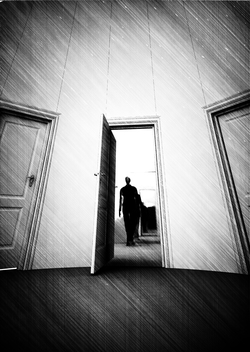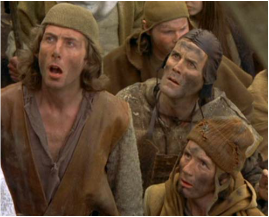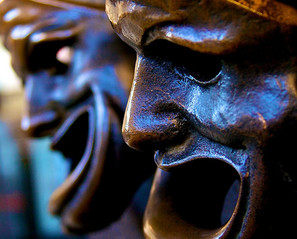 Today, we read the "Before the Law" parable by Franz Kafka. I remembered reading this in Kafka's full length novel, The Trial. However, I was not sure if I totally absorbed its meaning the first time around. In the context of such a straightforward book, it surprised me that something so symbolic was juxtaposed within it. Nevertheless, reading it now, isolated from the rest of the book, I not only was able to connect its purpose in The Trial, but in Antigone as well. The parable is the story of a man who approaches the door to the law, guarded by a stark doorkeeper. The man pleads to enter and is told that he may, but not right now. So the man waits for what turn into years. He attempts to bribe the doorkeeper and chat with him, yet the doorkeeper only continues saying the man is not to go in at the moment. Finally, the man has become old and close to his death. As his vision leaves him, he only sees the law more radiantly. His thoughts culminate into one final questions for the doorkeeper, "Everyone strives to reach the Law...so how does it happen that for all these many years no one but myself has ever begged for admittance?" and the doorkeeper responds by telling him that this door was here only for the man, and the doorkeeper finishes by shutting the door as the man dies. Though I had a sort of epiphany regarding The Trial, it was all the more amazing that I connected it with Antigone. This parable illustrates that if you practice submission to the law absolutely, nothing will ever change. If the man at the door were Antigone, he would've strode right past the doorkeeper and into the law. Though she is sentenced and dies as a result, it makes Kreon have a change of heart. Such an immovable character begins to beg for forgiveness. He never would have considered the effect his actions have on those around him had Antigone never defied him. Kreon would remain in his old, traditional ways. He would still believe that as king, he does not need to consider the needs of the many. Yes, she received punishment for entering the law, but it was important that she did so.
0 Comments
 Our TED Talk today was "Are We In Control of Our Decisions" by Dan Ariely. The purpose of the talk was for us to analyze how we make decisions and what may influence why we choose what we do. The overall trend that Ariely found was that the more complex a decision becomes, the more likely we are to search for the easiest route possible. It happens in all of us in all different situations. Different wording on a form at the DMV can influence the statistics of organ donors. Many find what happens to their bodies after they die a nonissue, so the decision of becoming an organ donor is not something that often weighs on the mind. So when the DMV form says that you must check the box to join the organ donor program, most people will not check the box simply because we do not think about it. If the form says that those who do not check the box will join the organ donor program, people will still leave the box unchecked because they aren't going to go out of their way to decide against it. On a bigger scale, when doctors were asked about a hypothetical patient planning to have a hip replacement, they would postpone the surgery if they found that they had one more medicine they had not had the patient try. However, if they found that there were two or more medications untried, they were more likely to send the patient on for surgery. Adding more variables makes the choice harder to make. Something actually very simple could make a decision have a very different outcome. When we were discussing the TED talk in my group, we instantly thought about how this applies to tragedies, especially Oedipus. If Laius and Jocasta were never told of the prophecy, they never would have left Oedipus to die. He would have been raised in their family and developed a parent-child bond with them. Oedipus killed Laius when his carriage was run off the road, completely unaware that it was his father that did so. Had he been raised by him, chances are he would have been in the carriage carrying Laius. I have no real need to mention why Jocasta would not have married Oedipus, as I think it's obvious enough.  Oedipus Rex is one of the few Greek tragedies that we have in its entirety. Though written by Sophocles, it fits the Aristotelian mold of tragedy perfectly. In it, King Oedipus, is hailed as a hero of Thebes for having solved the riddle of the sphinx. However, prophecy looms over his life. Adding salt to the wound, he becomes obsessed with disproving said prophecy. According to the god Apollo, Oedipus is meant to kill his father and marry his mother. He will bear children with her and subsequently such a disgusting act will mark their downfall. Throughout the story, bother Oedipus and his wife, Jocasta, can think of nothing else but this prophecy. Yet, when Oedipus calls in the blind prophet to tell him who killed the previous king Laius, he mocks his blindness and accuses him of lying when the prophet says Oedipus himself was the murderer. They both refuse to hear what they don't want. Oedipus repeatedly makes excuses to disprove the prophecy. He claims that his supposed parents live in Corinth, and his father has died of natural causes. Jocasta, who was married to Laius before his murder, claims that he was killed by bandits at a crossroads, not a single man. However, the truth becomes unbearably clear when the shepherd who discovered three day old Oedipus in the wild describes his real history. When King Laius heard that his child would kill him, he ordered the child be left to die of exposure, feet bound so he can move. Oedipus looks at his own disfigured ankles and realizes his mistakes. His parents in Corinth adopted him. He is the true son of Laius and Jocasta. He was the one who murdered Laius at the crossroads. Jocasta hangs herself out of shame, having her hopes of hiding the truth from Oedipus to protect his happiness crushed. Oedipus finds himself so guilty that he takes Jocasta's golden brooches from her dress and gouged out his eyes with them. Now blind, he can truly see. He becomes like Tiresias, aware now of the full truth.  As a class, we watched Alain de Boton's TED Talk "A Kinder, Gentler Philosophy of Success" to get a sense of how, even in today's world, we live in an environment set up for tragedy. Specifically, we are surrounded by the potential for a financial or occupational tragedy. When I say this, it may bring to mind bankruptcy of a large company or someone getting injured at work and suing, but this is not necessarily the case. All occupations bear this burden, simply because of the world in which we work. de Boton describes several reasons why we may feel these sort of career crises, as he calls them. First and foremost, we as a people are very judgmental when it comes to jobs. If we feel that others think our occupation is lowly or beneath them, we suffer a fall from what we have built ourselves up to be in the eyes of another. If you read my previous blog post, this may sound familiar. This is a tragic fear that all of us have. A fear of no longer being a pillar of society in the eyes of other. Losing that sense of self. With so many quick to judge, it becomes very easy to suffer this fall from self image. Another reason de Boton mentions is how our society is a 'meritocracy', or a society in which everyone is allowed success solely on merit. This sounds great, the perfect way for everyone to work for what they are given. However, this makes failure all the more monumental. If you are not successful, society will deem it a personal failure, and you become a 'loser'. In a meritocracy, anybody can just simply put in work and get successful, right? In a perfect world, yes. Is this a perfect world? Not at all. To think about this tragically, one who has achieved esteem and success can have it stripped away quicker than they achieved it. Accidents happen and it's not necessarily a personal failure. If you follow in the footsteps of modern society and how we judge, every tragic hero is a loser. That would be insane to say. Hamlet was not a loser, he was a man who could have had it all but had it stripped from him with the death of his father. Romeo and Juliet could have been happily married, but their families' feud was too great for their love to be accepted. These failures are not their own. We must remove these judgmental views from our mind. These tragic heroes are human. They signify what can happen to us. One of the most important points made in this video was that success must be your own. Your success will be different from the person sitting next to you. A happy life means something different to every person and that is okay. Because of this, we must take a firm look at what it is we truly want. If we don't, we will build what we think we want around what others want out of us. That just sets us up for tragedy.  In the essay "Tragedy and the Common Man" by Arthur Miller, the idea that a tragedy cannot take place with modern people is opened up and examined. In the stories of old, a tragedy was the downfall of some powerful figure. Oedipus the King, Prince Hamlet, the Montagues and the Capulets. Because of this, our age may think tragedy too high a prospect for the common world. Alternatively, we may find ourselves thinking that such a flaw featured in a tragedy could never befall our analytical minds. So a tragedy may be beneath modern mankind nowadays. Either way, tragedy finds itself out of favor in recent literary tradition. However, Miller seeks to refute the usual view of tragedy and prove that we, too, experience the tragic downfalls of a Greek king or noble families. In the beginning of his essay, Miller issues this statement, "...such as the Oedipus and Orestes complexes, for instance, which were enacted by royal beings but which apply to everyone in similar emotional situations." He is illustrating that tragedy continues to lurk amongst us, hidden in plain sight. We are connected to these ancient figures through emotion. No matter how much time separates us, we have never stopped being humans. As such, we will never cease to feel. A tragedy is defined by an outline of events that take place due to the protagonist and his emotions. So we may find ourselves in the same place. A struggle to gain the place you deem you deserve. Inability to accept your lot. Being torn from the image you have built of yourself. All of these are troubles the common man experiences. We all carry fear of losing favor of those around you, becoming hated or losing respect. We self-analyze to a fault, thinking ourselves into inadequacy. Many do regrettable things to climb the ruthless ladder of life to a point they feel deserving of. Mankind is touched by blossoming tragedy everyday that we are still as human as our ancestors. Miller concludes by calming the fears we may have awakened by realizing the abundance of tragedy in our world. "The possibility of victory must be there in tragedy." Tragedy provides an optimism that humanity is perfectible. It forces us to take a look around us and consider how to pull us from ignorance. Tragedy is inevitable because of the inherent imperfection of man. Nevertheless, we can always be striving for higher. These views have enlightened me to why we revere the tragic story. It exists within us all. The tragic flaw can touch us at any moment. Tragedy surrounds us, yet without suffocating us in pessimism. We must remain and we must improve.  When one thinks of tragedy, the first thing that comes to mind is an event causing sadness. However, from a literary stance, it may evoke a much different response. First and foremost, the presence of the tragedy is first recorded in Greek literature. Though we estimate the number of these pieces in the thousands, only 32 have been recovered in their entirety. From documentation of the artistic traditions of the time, we know how a tragedy was meant to effect the audience. The original Greek tragedy was indeed based on human suffering. Yet, the response received was one of catharsis, or purging of negative emotions. The audience was meant to feel great pleasure at the downfall of their protagonist. It seems odd and against expectation, since we as humans feel empathy when presented with a real undoing. However, in a dramatic setting, watching such an event unfold can bring a new sense of appreciation toward one's own life. The audience will feel relieved that they are not the protagonist. They will leave content with their station in life. As such, tragedy is an impactful development in literary tradition. Learning can be done from the mistakes made by the protagonist. In the modern age, tragedies act as a window into the issues deemed important in the age they were written. Sophocles uses prophecy, Shakespeare uses love. Both reflect what problems may have been the most immediate for the time. It stands apart from the commercial sob story in that there is a power, and almost optimism, in a true tragedy. It teaches you, it reminds you of your good fortune. Without it, literature would be unable to capture real issues, greatly decreasing its value to those reading it. Even its counterpart, comedy, needs tragedy for balance. |
ArchivesCategories |
 RSS Feed
RSS Feed
